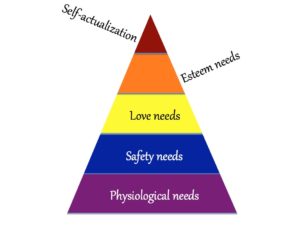Jeff (who runs the temple and was raised Jewish) asked if there were any Buddhists in the pews. The room was full but only three of four people raised their hands.
Some of Buddhism's parts have found a place in American society, but the whole thing hasn't really come along. It seems to be more a piece of culture for many Americans than a full-blown religion.
This is interesting, all things considered.
There's a question that a lot of people who think about Buddhism, at least its earlier forms, which are still practiced in Southeast Asia, have found themselves asking:
Why does it seem to be two religions?
Two Sides
One version is all about karma. It's about reaping what you sew, with the implication that if you do good, you'll get what you deserve. And it comes with the idea of reincarnation – that if you live a good life, you'll be rewarded with another life that you can do good with, ad infinitum.
Outside of temples, this version exists in the west, largely in the form of labels on tip jars.
The other religion involves the notions that life is suffering, that desires defile us, and that the final good for human beings is to seek nirvana and stop existing in any way that most of us can make sense of.
This is the one that has taken a foothold in the US.*
Why is this?
Why would people focus the decidedly less fun elements of the religion while letting the do-good-and-enjoy-your-rewards part slide away? I have a well-worked-out explanation for how these two parts work together in Thailand (described in my possibly-forth-coming book on the mechanics of belief). But why would Americans, with their interest in optimism and quick fixes, choose the harder, longer, less cheerful path to happiness?
A lot of the language around Buddhism in the US is about learning to give things up. This is something that almost all forms of Buddhism share, and that few other traditions have embraced: that happiness can be found by moving away from desire.
This emphasis on giving things up, quite unusual in the US in itself, is actually part of the draw. This isBuddhism's useful niche, considering that most other theories of happiness involve picking and choosing, and then satisfying, some sets of desires.
So it's more an antidote than a palliative to other popular approaches to happiness, like finding one's authentic self, or retail therapy, or the weather-beaten grandness of the "American Dream."
All approaches to happiness come with a theory the says something about what it means to be human, and how to live a good human life. Some argue for simplicity, others emphasize self-actualization (and explain what having a "self" is). Buddhism provides a theory of self in the form of "no-self." This popular conception does a couple things:
- It answers these other ways of thinking about life by encouraging people to think about their theories of self as just that – theories.
- Then, it encourages you to set them aside, and practice kindness, empathy, and relaxation.
Basically, this type of Buddhism provides a reply to every other theory of happiness. You want to get rich? Fine - but spend a little time wiping away the excesses of your material desire. You want to find the real you? OK, but don't cling too tightly to the idea that there is a real you. or that you can find it. Working too hard? Feeling listless and lazy? Here again, these curated elements of Buddhism can provide a little relief.
This isn't exactly what the Buddha had in mind. Fair enough – nothing in the modern world is. But it seems to work. So when Americans have had enough pursuing happiness in a variety of different ways, many end up at places like Dharma Bum Temple not intending to find nirvana, but to cleanse the pallet.
The mechanisms that bring this all together are a bit complex, but I've explained them – and the way that the idea of no-self leads to happiness – here, in the latest entry in my little encyclopedia of happiness.






